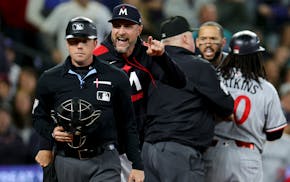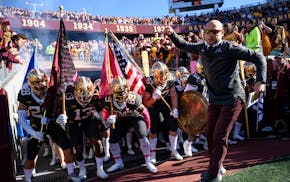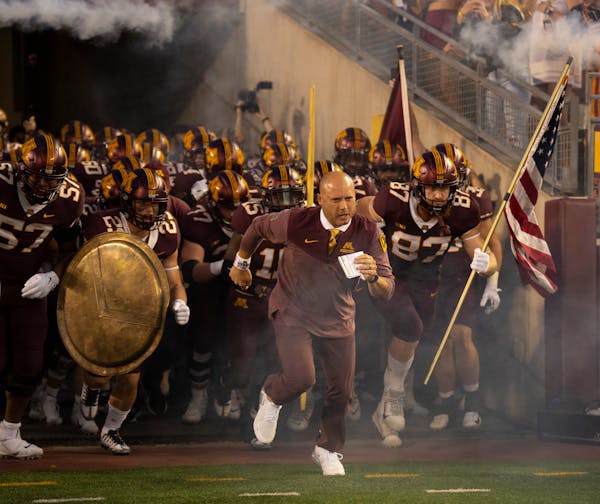The Western Illinois football team will face the Gophers on Saturday in what's a short-term marriage of convenience. If all goes according to Minnesota's plan, the Gophers will get a comfortable home victory and the Fighting Leathernecks will leave with $450,000 for their athletic department's coffers.
Teams in the NCAA's Football Bowl Subdivision (FBS), like the Gophers, occasionally fill out their nonconference schedules with a Football Championship Subdivision (FCS) opponent, like Western Illinois. A victory over an FCS team still counts toward the six needed for bowl eligibility, and the arrangement often enables the FBS school to have an all-important seventh home game and the revenue it brings.
While playing an FCS team doesn't often bring marquee value, it does help in the complex task of scheduling because FCS schools don't have the leverage to demand a return home game.
"Listen, we're filling schedules every single year with who will play us, what fits for us, what the dynamics are for years to come,'' Gophers coach P.J. Fleck said. "We're scheduling games 15 years out right now.''
For the Gophers, the general philosophy of nonconference scheduling has been to have one game against a team from the other Power Five conferences (ACC, Big 12, Pac-12 and SEC) and one or two from the Group of Five (American Athletic, Conference USA, Mid-American, Mountain West and Sun Belt), or an FCS opponent if needed.
That's playing out this year with the Gophers facing New Mexico State, Western Illinois and Colorado in their nonconference schedule. That trio was a combined 8-27 last year, so the Gophers aren't exactly facing a murderers' row.
This week, the Gophers are 37½-point favorites over Western Illinois, similar to the spread for last week's game against New Mexico State. Leaving with a victory, the chance to fine-tune their play and with good health are the primary objectives.
"It's a game, and it counts just as much as a conference game,'' Fleck said. "You have 12 guaranteed opportunities, and they all count as one no matter what you win by.''
FCS teams can bite back
The last time the Gophers faced an FCS team was in the 2019 season opener against South Dakota State. The Jackrabbits led early in the fourth quarter of an eventual 28-21 Minnesota win, throwing a major scare into a Gophers team that would finish 11-2.
Western Illinois comes from the Missouri Valley Conference, which includes SDSU and North Dakota State, winner of nine of the past 11 FCS championships. Don't, however, expect the Leathernecks to be at the same competitive level of those two Dakota schools. Western Illinois is coming off a 2-9 season in 2021, has a first-year coach in Myers Hendrickson and just absorbed a 17-point loss to Tennessee-Martin.
"Having coached on that level, I know it's going to be their Super Bowl,'' Gophers offensive coordinator Kirk Ciarrocca said. "We're going to get everything they've got. They're going to be in a big-time college football environment, and that's going to help fuel them. … They're dangerous.''
There are dangers in playing FCS teams. If you win, it's the expected triumph of Goliath over David. If you lose, you're the Philistine felled by the Israelite's sling and stone. It's especially embarrassing when the FCS team is from nearby and its fan base can rub your nose in the result.
The Gophers faced that indignity three times in a five-year span starting 15 years ago. In Tim Brewster's first season as Gophers coach in 2007, Minnesota lost 27-21 to North Dakota State. Three years later, the Gophers fell 41-38 to a South Dakota team that finished 4-7, a defeat that hastened Brewster's firing. A year later, NDSU rolled 37-24 in Jerry Kill's first year at Minnesota.
Learning from last year
Of course, it's not only FCS teams that can spoil what looks on paper like an easy win for a Power Five opponent. That magical 2019 Gophers season nearly was derailed in the nonconference portion, and not only by South Dakota State. Minnesota also needed great escapes against Fresno State and Georgia Southern to emerge unscathed.
Last year, the Gophers' fortune ran out when Bowling Green, a 31-point underdog, stunned Minnesota 14-10. That ended Minnesota's 13-game nonconference winning streak under Fleck. The kicker: The Gophers paid the Falcons $1.45 million to play the game.
When asked if the Bowling Green game still sticks in the Gophers' craw, center John Michael Schmitz said, "It definitely does. It's in there, but you've got to move on from it. Learn from your past to create your future so nothing like that happens again.''
Change is coming
What the Gophers schedule might look like in the future remains unclear because of the shifting landscape of college football. The Big Ten will expand to 16 teams beginning in the fall of 2024 with the addition of USC and UCLA, and Commissioner Kevin Warren recently said he could see the conference growing to 20 teams. If that happens, there's a chance the Big Ten schedule could increase from nine to 10 games per team each season, leaving only two nonconference opportunities.
Big Ten teams have removed future conference schedules from their websites, but the Gophers still have nonconference matchups listed as far out as 2030. Minnesota's upcoming schedules show a mix of Power Five, Group of Five and an occasional FCS opponent. Highlights include three home-and-home series against Power Five opponents: North Carolina (there in 2023, here in 2024), California (there in 2025, here in 2028) and Mississippi State (here in 2026, there in 2027).
Whether those games stay on the schedule will play out, and Fleck knows he must be ready for change.
"You're looking at it,'' he said, "and you don't even know what college football's going to look like.''

Twins' Correa ejected from on-deck circle, and he's not really sure why

Two offensive tackles, linebacker are first to commit to Gophers in 'Summer Splash' weekend

Neal: Girma returns to United States national team and rewards fans with her classiness

Twins' inability to score in extra innings costly in wild loss at Seattle


